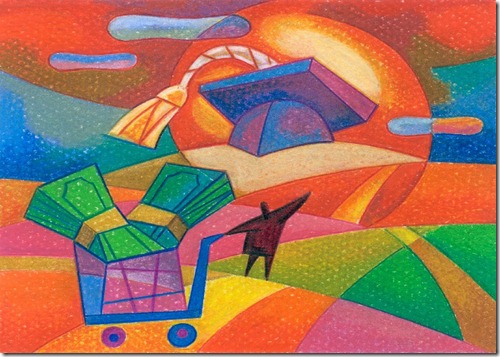The other day I read an article in BusinessWeek Magazine about bloggers who write openly about their financial net worth. Many are in search of wealth and want to broadcast their pursuit online. Some seek financial security and enjoy sharing their financial insights. Virtually all of them enjoy showing off the size of their wallets. I surfed over to NetWorthIQ.com, a website featured in BusinessWeek that is devoted to showcasing your net worth. It’s an interesting website. I opened an account and added our own statistics. BusinessWeek raves that it is a social networking site a la MySpace, but that’s much too generous. NetWorthIQ has a long way to go to match MySpace’s networking capabilities. For example, I couldn’t find any way to contact anyone else who registered on the site. NetWorthIQ allows you to see user’s net worth and check out their external blog and/or home page if they have one, but that’s about the only personalization the site offers.
American culture is paradoxical when it comes to financial matters. Americans don’t like to publicly discuss personal finances (e.g. divulging their salaries or annual income). Many Americans moralize about wealth, associating the pursuit of wealth with “good” or “evil.” Moralizing about money complicates discussions about financial matters. Few parents sit down with children and discuss financial discipline because it’s a touchy subject akin to talking about “the birds and the bees” (sex). Either the parents guard their own financial status closely, or they don’t know enough about the subject to talk about it. Instead, they assume that their children will learn fiscal responsibility through osmosis. Many children never do and perpetuate a cycle of financial ignorance when they become adults.
Despite any misgivings about money, Americans generally try to “keep up with the Joneses,” the Jones family being a theoretical peer you find yourself constantly comparing you to in terms of material consumption. If Mr. or Ms. Jones buys a new BMW, then you must buy a Mercedes to keep up with him or her. The open scene of the movie “Fun with Dick and Jane” captures this concept so well. Dick’s neighbor shows off his voice-activated Mercedes to Dick (Jim Carrey), and Dick responds by ordering his older BMW parked in his driveway to “sit” and “play dead.” The parked car obeys his commands. Americans typically display wealth through big-ticket items purchased at the level they can afford–a nice home, car, boat, a big-screen TV, or luxury goods, even a $5.00 cup of Starbucks coffee. A smaller cabal of Americans prefers to build wealth quietly and live modestly, saving and investing whenever possible. Some of us view material consumption as a liability; that is, if you buy something that costs money to maintain, it’s a liability and should be avoided. We prefer to limit consumption and build assets, avoiding consumption that drains our wallets. We need to purchase necessities that may cost money, such as a home, but we prefer to minimize these liabilities.
NetWorthIQ is valuable in that it allows you to benchmark your investment portfolios against others’ portfolios. “Benchmark” is a newfangled word that means you compare your investment portfolio to Mr. or Ms. Jones’ portfolios to build investing insight. The site has a great feature that allows you to compare your investing habits with others across many demographics, including geography, age, income level, and occupation. I find this information helpful in deciding which investment strategies to pursue. For example, according to NetWorthIQ users, higher net worth individuals typically own more liquid investments than retirement funds, and they invest more money in stocks than in bonds. Most also own real estate and “other” assets. Certainly, these types of comparisons can lead to a tendency to show off or an excessive desire to earn money. Nevertheless, when used correctly, they can help you build your net worth and gain positive insights into managing personal wealth.

World Adventurers Magazine












